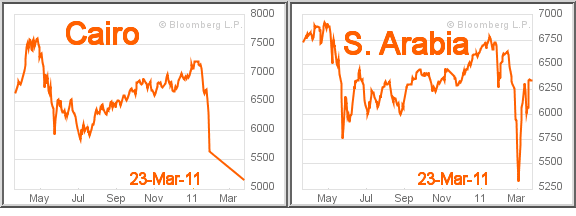
Dynamics

|
Generational Dynamics |
| Forecasting America's Destiny ... and the World's | |
| HOME WEB LOG COUNTRY WIKI COMMENT FORUM DOWNLOADS ABOUT | |
Europe's bonds, Cairo's stocks, and America's homes show worsening financial trends
A bomb blast at a Jerusalem bus stop on Wednesday killed one person and wounded dozens others, according to The National (UAE). Nobody has claimed responsibility fo the bombing, but Israeli police suspect Palestinian terrorists.
 |
According to a report by Debka:
"[T]he attack was professionally executed by a team of three to five with local aid from East Jerusalem Palestinians. While the authorities have reassured the city that it was a one-off attack, intelligence and terror experts are certain a terrorist organization activated trained bombers and may do so again.The 1-2 kilogram device planted in a suitcase was detonated at one of the busiest corners of Jerusalem, where taxis wait to pick up out-of-town arrivals and two buses take on passengers. The site of attack must have been picked in advance, with the bomber waiting in a getaway car nearby to detonate the device as one of the buses was pulling away and drive off to Arab Jerusalem or the West Bank before the police arrived. This method is familiar from the 2003-2006 Palestinian war of terror. The police initially set up road blocks on the highway to Tel Aviv before realizing too late that the bombers had headed east."
Many analysts believe that a splinter terrorist group planted the bomb, and that Hamas was not responsible, according to Haaretz.
Nonetheless, the bombing comes at a time when a border conflict between Gaza and Israel is escalating, for the first time since the war between Israel and Gaza ended early in 2009.
It began last week, when some Palestinian analysts were saying that Hamas was launching mortar shells into southern Israel in order to provoke an Israeli response to end youth protests demanding Hamas/Fatah reconciliation. (See "21-Mar-11 News -- March 15 reconciliation movement triggers Hamas attacks on Israel.")
Al-Quds Brigades of Islamic Jihad claimed responsibility for some of the missile attacks on Israeli towns.
In response, the Israel Air Force has been stepping up attacks on Gaza, according to the Jerusalem Post. Israeli airstrikes have targeted smuggling tunnels along the Gaza-Egypt border, and a Hamas training camp in central Gaza.
The escalation along this border comes at a time when violence is also escalating in Deraa in southern Syria, near the border to Jordan.
On Wednesday, Syrian security forces attacked a mosque that had been the focus of anti-government demonstrations, according to the Guardian. Syrian security forces opened fire on scores of young protesters from surrounding towns as they offered support to the protests. At least 15 protesters were shot dead on Wednesday, and dozens more were injured.
Generational Dynamics predicts that the Mideast is headed for a new war, re-fighting the genocidal war between Arabs and Jews that followed the partitioning of Palestine and the creation of the state of Israel in 1948.
A couple of weeks ago I pointed out that it was the periphery of the Mideast (Tunisia, Yemen, Bahrain, Libya) that was becoming unstable first, and I suggested that the instability would begin to spread toward the "center."
That now appears to be happening, as the instability is spreading to Palestine and Jerusalem, with Israel in conflict with Hamas, and the United States and Europe involved in Libya.
Everyone is expecting all of these conflicts and revolutions to simmer down after a while, and possibly they will. But the US, Europe and the Mideast are in a generational Crisis era, which makes this time quite different from the 1990s.
In the 1990s, with the Silent Generation still in place, people were much more conciliatory and willing to compromise. But today, with the Boomers and Gen-Xers in positions of power, people are "attracted" towards confrontation and conflict, rather than conciliation and compromise. This means that a conflict that might have fizzled out in the 1990s is more likely to escalate in 2011.
So it's possible that the various Arab Revolutions and border conflicts will simmer down, but in a generational Crisis era, it's more likely that they will continue to escalate and reach full scale war.
Many of the financial problems that have been getting ignored began to reassert themselves this week.
 |
Portugal's government is close to collapse on Wednesday, after the Parliament rejected an austerity ("stability and growth") plan proposed by prime minister José Sócrates, according to Bloomberg. It's thought that this major political defeat will force Socrates to dissolve the government and call early elections.
Portugal has been playing the same game the Ireland and Greece played, to no avail, last year before they were bailed out by the European Union and the International Monetary Fund (IMF). The game is to pretend, for as long as possible that there's no debt problem, and that there's no chance of default.
However, as can be seen in the above array, the yield (interest rate) on Portugal's 10-year bonds has been increasing steadily during the last year, and now exceeds 7.5%. When investors demand higher yields, it means that investors believe that the likelihood of the country's default is increasing.
A 7.5% bond yield is not per se a sign of crisis, but the continuing, steady increase is a cause for great concern.
What REALLY creates the crisis atmosphere is the bond yields for Ireland and Greece. Those two countries were bailed out last year, and the politicians promised that the bailouts would guarantee that the two countries would NOT default. Ireland's bond yields now exceed 10%, and Greece's exceed 12%. The yields keep increasing even though both countries were "bailed out," and even though both countries have implemented sharp austerity programs to reduce debt.
So, you can imagine being an MP in Portugal, deciding whether to vote for Socrates' austerity proposal, and looking at the above array of graphs, and thinking, "It's perfectly obvious that Portugal is not going to do any better than Greece or Ireland did, so why even bother to pass an austerity program? I might as well vote against it, and say we can do well without an austerity program. That's a lie, but who cares, as long as I get re-elected next time?"
Certainly lying politicians, analysts and journalists are the norm these days, but in this case, it's really obvious. When these bailouts occurred last year, a number of analysts did the math and reported that both Ireland and Greece were in a debt spiral that was inescapable, and that it's IMPOSSIBLE for them to avoid default.
Still, they all play the game, and aver that their countries will avoid default. Are they just lying, or do they have any justification at all for their aversion to the truth?
There are two unrealistic assumptions that they and others make, either consciously or unconsciously.
First, they believe that the current "recession" will pass, and that the global economy will return to the days of the huge real estate and credit bubbles. That's obviously impossible, but it's a visceral hope.
Second, they believe that quantitative easing and other government programs are going to lead to inflation and hyperinflation, which would wipe all debts out. Once again, that's impossible, since financial institutions are still rapidly deleveraging, meaning that each week there's less money in the world than there was the week before, and the world is in a deflationary spiral.
See "14-Feb-11 News -- Bangladesh stock market continues free fall, while Cairo's remains closed" for further information.
As the riots began in Egypt, Cairo's stock exchange crashed, falling 20% in a few days. (See "28-Jan-11 News -- Egypt stock market crashes as riots spread through Mideast.")
 |
The stock exchange reopened on Wednesday for the first time since January 27, and fell an additional 8.9% in a shortened trading day, according to Bloomberg.
Saudi Arabia's stock exchange has partially recovered from the collapse that occurred when the riots occurred in neighboring Bahrain. Officials are hoping that it will recover further, but that may depend on whether the Mideast "Arab revolutions" begin to stabilize. So far, they show no sign of doing so.
I saw Robert Shiller, co-author of the S&P/Case-Shiller home price index, on Bloomberg TV a few days ago, and he said that the real estate bubble in 2004-2007 was the "biggest bubble in world history."
Huh? How is that possible? At the time it was going on, there were a few people (like me) around who were calling it a huge bubble, but if you listened to the journalists and analysts and politicians on CNBC and Bloomberg TV, you were told that there was no real estate bubble at all.
Mainstream financial analysts, economists and journalists would say, "Housing prices can't go down -- people have to live somewhere," and "Banks won't foreclose -- it's not in their interest to do so" and "These housing construction firms know what they're doing, and they wouldn't be building houses if it were just a bubble."
What I mean is this: If it was the biggest real estate bubble in history, then it must have been bigger than a tsunami, and we don't have trouble seeing what a tsunami does. How come we can't see the biggest bubble in history?
Well, sorry for the rant, but existing home sales fell 9.6% in February from January, much more than expected, according to the National Association of Realtors, the organization which, in 2005-2007, was the most notorious in claiming that there was no real estate bubble.
Prices for existing homes fell 5.2% from February 2010. "Distressed homes" accounted for 39% of the sales. The percentage of all-cash sales was at an all-time record of 33%, because mortgages are generally unavailable to most buyers. That was existing home sales.
Sales of new homes fell a phenomenal 16.9% to a record low in February, the lowest since records began in 1963, according to Reuters.
Bill McBridge at the Calculated Risk blog, has provided the following graph of the "Distressing Gap":
 |
He describes this graph as follows:
"[T]his graph shows existing home sales (left axis) and new home sales (right axis) through February. This graph starts in 1994, but the relationship has been fairly steady back to the '60s. Then along came the housing bubble and bust, and the "distressing gap" appeared (due mostly to distressed sales).The gap is due mostly to the flood of distressed sales. This has kept existing home sales elevated, and depressed new home sales since builders can't compete with the low prices of all the foreclosed properties."
On almost every day for the last three years, I've been hearing that "real estate has reached a bottom and will start to go up." The people saying this are the same people who said that there wasn't a housing bubble in the first place.
From the point of view of Generational Dynamics, the worst of the financial crisis has not yet occurred. There's no way to know what the trigger will be, but in this report I've described three different possibililties -- a European debt crisis, stock market crashes in developing nations, and continuing collapse of the real estate market.
The "Arab Revolutions" are destabilizing the Mideast more almost every day. Unless the Mideast begins to stabilize, the financial crisis trigger may be close.
(Comments: For reader comments, questions and discussion,
see the 24-Mar-11 News -- Jerusalem bombing comes as Gaza/Israel border war may escalate
thread of the Generational Dynamics forum. Comments may be
posted anonymously.)
(24-Mar-2011)
Permanent Link
Receive daily World View columns by e-mail
Donate to Generational Dynamics via PayPal
Web Log Summary - 2016
Web Log Summary - 2015
Web Log Summary - 2014
Web Log Summary - 2013
Web Log Summary - 2012
Web Log Summary - 2011
Web Log Summary - 2010
Web Log Summary - 2009
Web Log Summary - 2008
Web Log Summary - 2007
Web Log Summary - 2006
Web Log Summary - 2005
Web Log Summary - 2004
Web Log - December, 2016
Web Log - November, 2016
Web Log - October, 2016
Web Log - September, 2016
Web Log - August, 2016
Web Log - July, 2016
Web Log - June, 2016
Web Log - May, 2016
Web Log - April, 2016
Web Log - March, 2016
Web Log - February, 2016
Web Log - January, 2016
Web Log - December, 2015
Web Log - November, 2015
Web Log - October, 2015
Web Log - September, 2015
Web Log - August, 2015
Web Log - July, 2015
Web Log - June, 2015
Web Log - May, 2015
Web Log - April, 2015
Web Log - March, 2015
Web Log - February, 2015
Web Log - January, 2015
Web Log - December, 2014
Web Log - November, 2014
Web Log - October, 2014
Web Log - September, 2014
Web Log - August, 2014
Web Log - July, 2014
Web Log - June, 2014
Web Log - May, 2014
Web Log - April, 2014
Web Log - March, 2014
Web Log - February, 2014
Web Log - January, 2014
Web Log - December, 2013
Web Log - November, 2013
Web Log - October, 2013
Web Log - September, 2013
Web Log - August, 2013
Web Log - July, 2013
Web Log - June, 2013
Web Log - May, 2013
Web Log - April, 2013
Web Log - March, 2013
Web Log - February, 2013
Web Log - January, 2013
Web Log - December, 2012
Web Log - November, 2012
Web Log - October, 2012
Web Log - September, 2012
Web Log - August, 2012
Web Log - July, 2012
Web Log - June, 2012
Web Log - May, 2012
Web Log - April, 2012
Web Log - March, 2012
Web Log - February, 2012
Web Log - January, 2012
Web Log - December, 2011
Web Log - November, 2011
Web Log - October, 2011
Web Log - September, 2011
Web Log - August, 2011
Web Log - July, 2011
Web Log - June, 2011
Web Log - May, 2011
Web Log - April, 2011
Web Log - March, 2011
Web Log - February, 2011
Web Log - January, 2011
Web Log - December, 2010
Web Log - November, 2010
Web Log - October, 2010
Web Log - September, 2010
Web Log - August, 2010
Web Log - July, 2010
Web Log - June, 2010
Web Log - May, 2010
Web Log - April, 2010
Web Log - March, 2010
Web Log - February, 2010
Web Log - January, 2010
Web Log - December, 2009
Web Log - November, 2009
Web Log - October, 2009
Web Log - September, 2009
Web Log - August, 2009
Web Log - July, 2009
Web Log - June, 2009
Web Log - May, 2009
Web Log - April, 2009
Web Log - March, 2009
Web Log - February, 2009
Web Log - January, 2009
Web Log - December, 2008
Web Log - November, 2008
Web Log - October, 2008
Web Log - September, 2008
Web Log - August, 2008
Web Log - July, 2008
Web Log - June, 2008
Web Log - May, 2008
Web Log - April, 2008
Web Log - March, 2008
Web Log - February, 2008
Web Log - January, 2008
Web Log - December, 2007
Web Log - November, 2007
Web Log - October, 2007
Web Log - September, 2007
Web Log - August, 2007
Web Log - July, 2007
Web Log - June, 2007
Web Log - May, 2007
Web Log - April, 2007
Web Log - March, 2007
Web Log - February, 2007
Web Log - January, 2007
Web Log - December, 2006
Web Log - November, 2006
Web Log - October, 2006
Web Log - September, 2006
Web Log - August, 2006
Web Log - July, 2006
Web Log - June, 2006
Web Log - May, 2006
Web Log - April, 2006
Web Log - March, 2006
Web Log - February, 2006
Web Log - January, 2006
Web Log - December, 2005
Web Log - November, 2005
Web Log - October, 2005
Web Log - September, 2005
Web Log - August, 2005
Web Log - July, 2005
Web Log - June, 2005
Web Log - May, 2005
Web Log - April, 2005
Web Log - March, 2005
Web Log - February, 2005
Web Log - January, 2005
Web Log - December, 2004
Web Log - November, 2004
Web Log - October, 2004
Web Log - September, 2004
Web Log - August, 2004
Web Log - July, 2004
Web Log - June, 2004